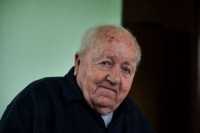To help is a duty
Prosper Pajtinka was born on November 25, 1926, in Šípkov as the second of 4 children. During World War II, he helped the partisan movement and witnessed tragic events in the village of Šípkov, where the Germans murdered 23 inhabitants. After the war he left to the Czech Republic, graduating from a construction school in Prague. In the 1950s, he worked as a master in Jáchymov and after 1962 for the “Odersko-Labska plavba” in Ústí nad Labem. He married to Morava, where he lived until 2014. He has two sons, both of whom are engineers.
